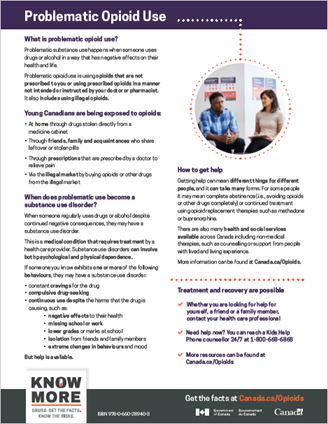Problematic Opioid Use (fact sheet)
What is problematic opioid use?
Problematic substance use happens when someone uses drugs or alcohol in a way that has negative effects on their health and life.
Problematic opioid use is using opioids that are not prescribed to you or using prescribed opioids in a manner not intended or instructed by your doctor or pharmacist. It also includes using illegal opioids.
Young Canadians are being exposed to opioids:
- At home through drugs stolen directly from a medicine cabinet
- Through friends, family and acquaintances who share leftover or stolen pills
- Through prescriptions that are prescribed by a doctor to relieve pain
- Via the illegal market by buying opioids or other drugs from the illegal market
When does problematic use become a substance use disorder?
When someone regularly uses drugs or alcohol despite continued negative consequences, they may have a substance use disorder.
This is a medical condition that requires treatment by a health care provider. Substance use disorders can involve both psychological and physical dependence.
If someone you know exhibits one or more of the following behaviours, they may have a substance use disorder:
- constant cravings for the drug
- compulsive drug-seeking
- continuous use despite the harms that the drug is causing, such as:
- negative effects to their health
- missing school or work
- lower grades or marks at school
- isolation from friends and family members
- extreme changes in behaviours and mood
But help is available.
How to get help
Getting help can mean different things for different people, and it can take many forms. For some people it may mean complete abstinence (i.e., avoiding opioids or other drugs completely) or continued treatment using opioid replacement therapies such as methadone or buprenorphine.
There are also many health and social services available across Canada including non-medical therapies, such as counselling or support from people with lived and living experience.
Treatment and recovery are possible
- Whether you are looking for help for yourself, a friend or a family member, contact your health care professional
- Need help now? You can reach a Kids Help Phone counsellor 24/7 at 1‑800-668-6868
- More resources can be found at Canada.ca/Opioids
Get the facts at Canada.ca/Opioids

Download the alternative format
(PDF format, 544 K, 1 page)
Organization: Health Canada
Type: Fact sheet
Date published: March 2019